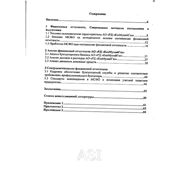Management in the media industry of the Republic of Kazakhstan, Алматы
Описание товара
Management in the media industry of the Republic of Kazakhstan
Plan
Introduction
1 Principles and theoretical approaches of management in the media industry
1.1 Peculiarities of management process in the media industry as one of the youngest and important industries
1.2 Analysis of foreign countries experience in management in the media industry
1.3 Development of management in the media industry of the Republic of Kazakhstan
2 “Videostyle” production studio as an example of company operating in the media sphere
2.1 Analysis of “VideoStyle” production studio activity and the main characteristics of provided services
2.1.2 Analysis of technical and economical indicators of LLP “VideoStyle” production
2.2 The main features of management process in “VideoStyle” production studio
2.3 Disadvantages of management system in LLP “VideoStyle” production and methods of its elaboration
3 Perspectives of efficiency improvement of management in the media industry of RK
3.1 Existing Weaknesses and problems of management system in the media sphere
3.2 Recommendations for improvement of management in the media industry of the RK
Conclusion
List of the used literature
Introduction
Management in the media industry is one of the youngest branches of management. In order to understand the meaning management in the media and to identify peculiarities of management process in the media industry it is necessary to consider management and media industry separately.
Management is the act of getting people together to accomplish desired goals and objectives using available resources efficiently and effectively. Management comprises planning, organizing, staffing, leading or directing, and controlling an organization (a group of one or more people or entities) or effort for the purpose of accomplishing a goal.
Since organizations can be viewed as systems, management can also be defined as human action, including design, to facilitate the production of useful outcomes from a system. This view opens the opportunity to 'manage' oneself, a pre-requisite to attempting to manage others.
Media industry or mass media refers collectively to all media technologies that are intended to reach a large audience via mass communication.
Sophisticated societies are dependent on mass media to deliver health information. Marshall McLuhan calls media "extensions of man." G. L. Kreps and B. C. Thornton believe media extend "people's ability to communicate, to speak to others far away, to hear messages, and to see images that would be unavailable without media".
It follows that employment of mass media to disseminate health news (or other matters) has, in effect, reduced the world's size. The value of health news is related to what gets reported and how it gets reported. According to Ray Moynihan and colleagues:
“The news media are an important source of information about health and medical therapies, and there is widespread interest in the quality of reporting. Previous studies have identified inaccurate coverage of published scientific papers, overstatement of adverse effects or risks, and evidence of sensationalism. The media can also have a positive public health role, as they did in communicating simple warnings about the connection between Reye's syndrome and the use of aspirin in children.”
Despite the potential of news media to perform valuable health-education functions, Moynihan et al. conclude that media stories about medications continue to be incomplete in their coverage of benefits, risks, and costs of drugs, as well as in reporting financial ties between clinical trial investigators and pharmaceutical manufacturers.
The mass media are capable of facilitating short-term, intermediate-term, and long-term effects on audiences. Short-term objectives include exposing audiences to health concepts; creating awareness and knowledge; altering outdated or incorrect knowledge; and enhancing audience recall of particular advertisements or public service announcements (PSAs), promotions, or program names. Intermediate-term objectives include all of the above, as well as changes in attitudes, behaviors, and perceptions of social norms. Finally, long-term objectives incorporate all of the aforementioned tasks, in addition to focused restructuring of perceived social norms, and maintenance of behavior change. Evidence of achieving these three tiers of objectives is useful in evaluating the effectiveness of mass media.
Mass media performs three key functions: educating, shaping public relations, and advocating for a particular policy or point of view. As education tools, media not only impart knowledge, but can be part of larger efforts (e.g., social marketing) to promote actions having social utility. As public relations tools, media assist organizations in achieving credibility and respect among public health opinion leaders, stakeholders, and other gatekeepers. Finally, as advocacy tools, mass media assist leaders in setting a policy agenda, shaping debates about controversial issues, and gaining support for particular viewpoints.
List of the used literature
- Abyz News Links. "Kazakhstan: Newspapers and News Sources," 2001. Available at .
- Akiner, Shirin. The Formation of Kazakh Identity: From Tribe to Nation-State. London: The Royal Institute of International Affairs, Russian and CIS Programme, 1995.
- Alaolmolki, Nozar. Life After the Soviet Union: The Newly Independent Republics of the Transcaucasus and Central Asia. Albany, NY: State University of New York Press, 2001.
- Almaty Herald. "About Us," 2001. Available at .
- BBC Monitoring. "Country profile: Kazakhstan." The British Broadcasting Corporation, June 13, 2002. Available at .
- BBC Monitoring. "Journalist's daughter dies in Kazakhstan after Swiss corruption probe." The British Broadcasting Corporation, July 11, 2002.
- Baker, Peter. "New Repression in Kazakhstan: Journalists Targeted After President Implicated in Scandal." Washington Post Foreign Service, June 10, 2002, A12. Available at .
- Bisenova, Alima. "Nazarbayev Media Maneuver Indicative of More Conciliatory Stance towards Opposition." Eurasia Insight article, March 20, 2002.
- Blua, Antoine. "Kazakh Government Clamps Down on Independent Media." EurasiaNet Partner Post from Radio Free Europe/Radio Liberty, EurasiaNet Human Rights article, March 9, 2002.
- Bureau of Democracy, Human Rights, and Labor, U.S. Department of State. "Kazakhstan." Country Reports on Human Rights Practices 2001. Washington, DC: Bureau of Public Affairs, U.S. Department of State, March 4, 2002. Available at .
- Central Intelligence Agency. "Kazakhstan." The World Factbook 2001. Washington, DC: CIA. Available at .
- Committee to Protect Journalists. "Kazakhstan: Two opposition newspapers attacked." CPJ 2002 news alert. New York, May 22, 2002. Available at .
- Dailey, Erika. "The Internet a High-Tech Venue for Human Rights Violations in Central Asia and the Caucasus." EurasiaNet Human Rights article, February 16, 2000.
- Dawisha, Karen, and Bruce Parrott, eds. Conflict, cleavage, and change in Central Asia and the Caucasus, Democratization and Authoritarianism in Postcommunist Societies: 4. Cambridge, UK, New York, NY, and Oak-leigh, Melbourne, Australia: Cambridge University Press, 1997.
- Dicks, Norman D. "Statement of Hon. Norman D. Dicks of the U.S. House of Representatives, July 18, 2002." Washington, DC: Congressional Record, July 18, 2002.
- Dombrovsky, Nicolay. "Democratic Choice of Kazakhstan members anxious for ailing leader." The Almaty Herald, June 2002. Available at .
- Dunphy, Harry. "State Department reveals concerns about legislation in Kazakhstan." The Associated Press, July 22, 2002.
- Duvanov, Sergei. "Kazakhstan's Security Services Attempt To Establish Control Over Internet." EurasiaNet Business and Economics article, May 11, 2000.
- Eurasia Internet. "Kazakhstan: Parliamentary Briefing." July 15, 2002. Available at .
- EurasiaNet. "Kazakhstan Becoming A Key To Russia's Central Asia Strategy." Eurasia Insight article, February 1, 2001.
- George, Alexandra. Journey into Kazakhstan: The True Face of the Nazarbayev Regime. Lanham, MD, New York, NY, and Oxford, UK: University Press of America, Inc., 2001.
- Human Rights Watch. "Kazakhstan." Human Rights Watch World Report 2002. Available at .
- IAC Eurasia. "21st Century Pirates: Companies Kaztelecom and Nursat." London: IAC EURASIA-Internet, March 5, 2002.
- Integrated Regional Information Networks (IRIN). "Independent press stifled in Kazakhstan." August 1, 2002. Available at .
- Interfax-Kazakhstan news agency. "Kazakh journalist suspected of libelling president" (report excerpt). Almaty, July 15, 2002. Transmitted by BBC Monitoring Service, July 16, 2002.
- International Research and Exchanges Board (IREX). "IREX Publishes Its First Media Sustainability Index," 2001. Available at .
- IREX. "Kazakhstan." 2001 Media Sustainability Index Report. Available at .
- Internet Encyclopedia of Philosophy, The. "Thomas Hobbes (1588-1679)." 2001. Available at .
- Kaiser, Robert G. "Kazakhs' Season of Repression: President of Key U.S. Ally Puts Critics on Trial, in Jail." The Washington Post, Washington, DC, July 22, 2002, A01. Available at .
- Kazakhstan Press Club. "What is the Kazakhstan Press Club (KPC)?" 2002. Available at .
- Kazhegeldin, Akezhan. Kazakhstan: Meeting the Challenges Ahead. Printed in the United States, 1998.
- Kusainov, Aldar. "Nazarbayev Presses against Political Opponents." EurasiaNet Human Rights article, April 2, 2002.
- Kusainov, Aldar. "Opposition in Kazakhstan Press Campaign To Dilute President's Authority." EurasiaNet Human Rights article, March 19, 2002.
- Landau, Jacob M., and Barbara Kellner-Heinkele. Politics of Language in the ex-Soviet Muslim States: Azerbaijan, Uzbekistan, Kazakhstan, Kyrgyzstan, Turkmenistan and Tajikistan. Ann Arbor: The University of Michigan Press, 2001.
- Meehan, Martin T. "Erosion of Human Rights and Fundamental Freedoms in Kazakhstan." Statement of the Hon. Martin T. Meehan of the U.S. House of Representatives, May 23, 2002. Washington, DC: Congressional Record, May 24, 2002, page E918.
- Naranjargal, Hashhuu. "On the Road to Freedom?" Brussels: International Federation of Journalists, November 1998. Available at .
Похожие услуги от « ASI»
Услуги, похожие на Management in the media industry of the Republic of Kazakhstan
Вы можете оформить заявку на «Management in the media industry of the Republic of Kazakhstan» в организации «ASI» через наш портал БизОрг. Цена 30000 Тенге (минимальный заказ 1 шт). На сегодня предложение находится в статусе "в наличии".
Почему «ASI»
специальное предложение по цене для пользователей площадки БизОрг;
своевременное выполнение взятых обязательств;
разнообразные методы оплаты.
Ждем Вашего звонка!
FAQ
- Как оставить заявку?Чтобы оставить заявку на «Management in the media industry of the Republic of Kazakhstan» свяжитесь с фирмой «ASI» по контактным данным, которые указаны в правом верхнем углу. Обязательно укажите, что нашли организацию на площадке БизОрг.
- Где узнать более полную информацию об организации «ASI»?Для получения подробных даных об организации перейдите в правом верхнем углу по ссылке с названием фирмы. Затем перейдите на интересную Вам вкладку с описанием.
- Предложение описано с ошибками, контактный номер телефона не отвечает и т.п.Если у вас появились проблемы при взаимодействии с «ASI» – сообщите идентификаторы организации (161747) и товара/услуги (7501599) в нашу службу поддержки пользователей.
Служебная информация
«Management in the media industry of the Republic of Kazakhstan» можно найти в следующей категории: «Дипломные работы».
Предложение появилось на сайте 16.09.2013, дата последнего обновления - 14.04.2020.
За это время предложение было просмотрено 359 раз.













